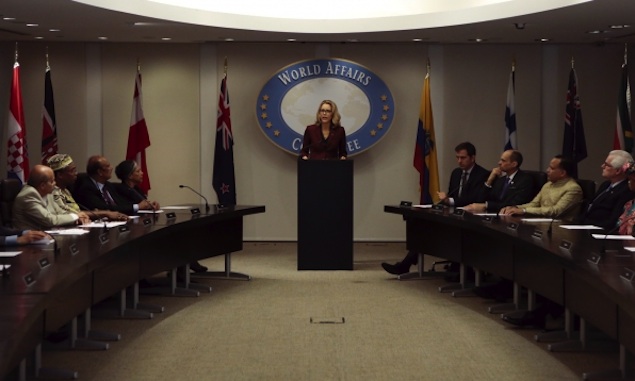Is Bess a bleeding heart? I found myself wondering that this week, as our heroine ignored protocol and the security of her and her staffers’ jobs as she jumped through flaming hoops to achieve her goal. Yes, that goal was saving the lives of 50,000 innocent people (as the show continually reminded us), and yes she managed to pull it off, but you have to wonder: How many passes is POTUS going to give her before her blatant disregard for the art of politics gets her fired? Let’s recap.
The main plot this week centers on the small Republic of West Africa (RWA), which is about to embark on a campaign of ethnic cleansing against the Beko people. Bess gets the inside scoop from Henry’s old religion professor, now a priest, who says his niece and her two small children are fleeing from the impending violence and begs for her help. Bess is mostly PO’d that Henry let her get ambushed in her own home, but pledges to find out what she can. Meanwhile, she has to prepare for her first speech before the World Affairs Committee, which is so important that her staffers have prepared her lovely, polished remarks that say absolutely nothing. She’s also dealing with an increasingly twitchy Blake, who’s combing through Nadine’s call history and e-mails from when she worked for Secretary Marsh. Despite his skin of sass, Blake is apparently unable to act normally when he’s doing something suspicious, and Nadine immediately figures out that she’s being left out of the scheduling loop.
Bess meets with the RWA diplomat, who tells her (shocker) that his country has no plans to kill a subset of its population. So instead Bess goes to her CIA agent friend, who tells her the situation is about to get very dire. Bess goes to POTUS and Russell Jackson to try to convince them to get involved, rather than pledging aid after the catastrophe happens, and Jackson reminds her the region has zero resources that would justify US involvement.
Henry tries to get some reporter friends interested in the story, but Bess does him one (or several) better: Seeing that she won’t get what she wants by the usual means, and panicked about the impending slaughter of innocents, she uses her World Affairs Committee speech as a Hail Mary pass to explain the situation and entreat the attending nations to “have the courage” to address the conflict. The RWA diplomat gets up and leaves in a huff, but she manages to sufficiently convince the French representative, who pledges air support—as long as the US also gets involved. “I’m working on it,” says Bess.
Later that night, she gets the titular “call” to come to the White House, where Jackson is waiting for her—to fire her, Bess assumes, though to her credit she refuses to let him condescend to her even in her dire situation. But Jackson grudgingly tells her she managed to convince POTUS to contribute “logistical aid.” All’s hunky dory, right? Not so much: Turns out Henry’s former professor, in addition to giving him a B in college (!), has also been using the refugees he’s been helping to safety in Europe as drug mules, a fact that’s outed on national TV. Jackson wants the US to pull the support completely—“your half-baked rhetoric won’t matter if this intervention goes south and turns into Mogadishu,” he says—but POTUS doesn’t want the blood of 50,000 people on his hands, so he agrees to contribute air support.
Henry goes to visit his professor and rips him a new one for lying to him and trading one evil for another by allowing drugs to pass into other countries. “This is my little patch of darkness,” the priest says, by way of justification, but Henry isn’t having it. He says he’ll pray for the people of RWA (the first mention I can remember of him being actively religious), but otherwise, “you and I are done.”
Not so fast, Henry: The African troops are being blocked at the border of RWA by warlords, who’ve made a deal with the junta, and the US refuses to engage them by air. So Bess enlists Henry to convince his priest friend to offer them a better deal: payment by the US, delivered indirectly, of course. It’s ultimately successful; Bess gets to keep her job, all those innocent people get to keep their lives, and POTUS looks like a hero. Henry even decides to forgive the priest.
As for Nadine? Blake finds a record of a call between her and the unbelievably named Constantin Stahl, one of Marsh’s biggest backers, made while Bess was trying to salvage the Iranian peace talks in episode five. Is she a spy? No—just hyper-competent, which is why Stahl was offering her a job . . . which she turned down. Over Scotch in Nadine’s office, Bess confesses that she had her investigated, and Nadine counters that she figured it out thanks to Blake acting like “a Chihuahua who just peed on the carpet.” Up next in the investigation queue: Secretary Marsh himself.
A few thoughts:
This week in What Are the McCord Kids Up To?: Almost nothing, though Stevie does make an appearance as the world’s sagest teenager, quoting back to Bess some oddly Dolly Parton-esque advice from her childhood.
“I wanted us to have the other talk tonight.” It’s safe to say Bess has lost whatever headway she’d made with Russell Jackson. Man, does that guy want to fire her. Though I appreciated his “No Blood for Foil” bumper sticker idea.
Want Nadine to be totally honest with you? Just give her a glass and a half of Champagne.
The Daisy/Matt dalliance continues to be a thing. Let’s hope Matt gets better at flirting soon.
Find Tanya Pai on Twitter at @tanyapai.

















